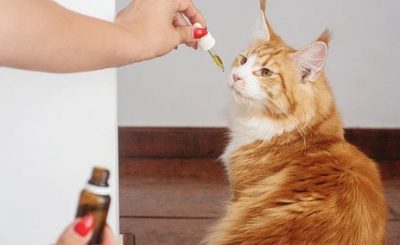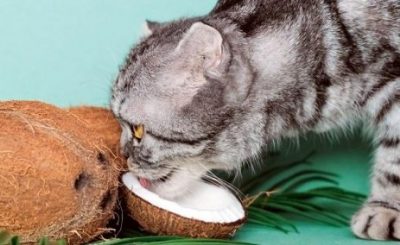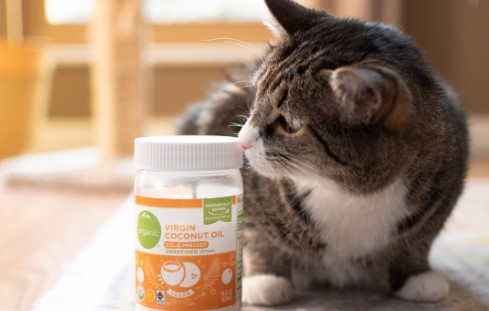While moisturising our body, we never forget the coconut oil. It helps in repairing skin barriers. In the same way, we often use it on our cats’ skin when they get dry. Meanwhile, we see them licking the oil, which makes us think, Can cats eat coconut oil?
Well, a definite amount and the right way of feeding coconut oil to cats is not a bad idea. In fact, the nutrients in coconut oil enhance the overall health of cats. It also gives benefits when used topically.
Before making any decision on whether to feed coconut oil to cats, let’s have an idea about its merits, demerits, and uses.
Table of Contents
What Is Coconut Oil?
Coconut oil is the oil coming from mature coconuts. People use it in their diet and also topically. You may see in many health and beauty products where coconut oil is the key ingredient. Compared to olive oil, avocado oil, soya bean oil, and other oils, coconut is more digestible. Its lauric acid, capric acid and caprylic acid contain antifungal properties that can support a person’s overall health.
Can Cats Eat Coconut Oil?
Cats can eat coconut well if they don’t have any allergies. In short, a healthy cat can eat coconut oil in moderation.
Coconut oil has the goodness of its antibacterial, antiviral, and antifungal properties. You can expect your cat to acquire them only if you consider the amount.

Don’t think feeding the right amount of coconut oil to a healthy cat is always safe. Sometimes her health record can be an issue. So ask your vet before letting your cat consume the coconut oil. If he says yes, then you can let eat it.
How To Feed Coconut Oil To Cats?
Feeding coconut oil to cats should always be minimal. If you want to avoid irritable bowel disorder, pancreatitis, or unhealthy metabolic conditions in your cat, the amount of it should be ⅕ of a tablespoon.
The perfect way to feed coconut oil to your cat would be to mix it with your cat’s meal. If her meal already has oil, no need to add coconut oil. But if her meal is dry, you can add moisture to it by adding coconut oil within the mentioned amount.
How To Use Coconut Oil For Cats?
When it comes to using coconut oil for cats, by that we mean the topical use. Well, coconut oil does wonders in alleviating skin issues of both humans and animals. If you find any rashes or dryness on your cat’s skin, rub a tiny portion of coconut oil on that part. Also, you can use it for your cat by mixing a few drops with her OTC shampoo.
Benefits Of Eating Coconut Oil For Cats
Adding a small amount of coconut oil to your cat’s diet is never a bad idea. Its lubricating properties will help to reduce hairballs and aid in the digestive system. Besides, its antimicrobial properties, like lauric acid, will combat viruses, bacteria, and fungi.
Cats can metabolise and absorb the medium-chain fatty acids of coconut oil easily. Hence, it will keep your cat’s GI tract smooth.
The medium-chain triglycerides (MCT) found in coconut oil works as an energy booster for cats. Also, it will improve your cat’s bone health and reduce pain caused by arthritis.
Risks Of Eating Coconut Oil For Cats
While coconut oil may have some potential benefits for cats, it is important to be aware of the risks as well. For instance, coconut oil has high saturated fats. This can be harmful for cats that are dealing with pancreatic inflammation. Besides, some cats have allergic reactions from using coconut oil both internally and topically.
Another issue with coconut oil is, it makes cats gain weight to an extra level. Some cats even get obese from the high calories from coconut oil. It is not a package of all essential nutrients. Hence, you can’t rely on it as a balanced source of nutrients for cats.

Note: Cats can have potential risks from coconut oil if they don’t intake or use it in the right quantity. Also, allergic and sensitive cats can have adverse effects from a small quantity of coconut oil.
Can Cats Eat Coconut Oil? Alternatives Of It
No wonder, coconut oil is not going to suit every cat. Sometimes you have to opt for some of its alternatives.
If you see, coconut oil does not have omega-3 fatty acid that is essential for cats. However, this nutrient is inevitable in fish oil. Especially the fish oil from salmon, krill, and anchovy are healthier options for cats.
Olive oil is also a good option if you want to add some safe fatty acids to your cat’s diet. It is rich in vitamin E and anti-inflammatory properties that can support a cat’s well-being.
Frequently Asked Questions: Can Cats Eat Coconut Oil?
What does coconut oil do for cats?
Coconut oil can support your cat’s digestive system if taken in a small quantity. Besides it heals damaged skin and fur with its antioxidant properties.
What oils can cats eat?
Oils like flaxseed oil, krill oil, coconut oil, olive oil, hemp oil, cod liver oil, etc are safe options for cats to eat. If you want you can use them for topical applications for your cat as they work as skin repairs.
What oils are not safe for cats?
Some oils are unsafe for cats both orally and topically. Such as ylang-ylang oil, wintergreen oil, tea tree oil, sweet birch oil, peppermint oil, cinnamon oil, and many other essential oils.
Final Thoughts
After knowing some common aspects of coconut oil, we still may wonder, Can cats eat coconut oil? The answer is yes if you feed it to her in less than half a teaspoon. Also, we suggest feeding this oil to your cat if she does not have any allergies or a weak digestive system.
Let’s say your cat ate more coconut oil than required, in such cases you must notice her symptoms. If she vomits, let her do that. This will discharge the toxins away. If the condition gets worse, ask your vet for guidance and provide the prescribed medicines to your cat.
















